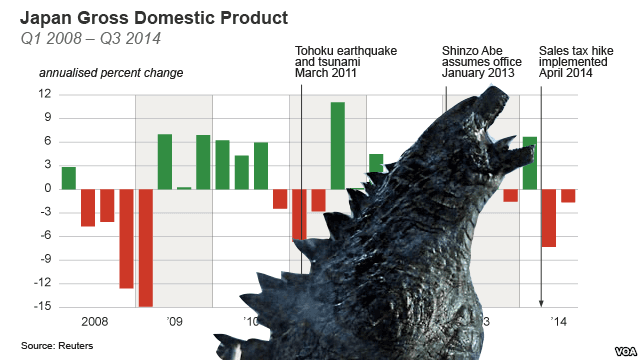In a move to try to implement heftier agricultural reforms and speed up US-Japan Trans-Pacific Trade Partnership negotiations, Prime Minister Shinzo Abe has worked with Liberal Democratic Party (LDP) policymakers to agree to transform the Central Union of Agricultural Cooperatives – or JA-Zenchu – into a new, less powerful organization.
In May, the government’s Council for Regulatory Reform proposed that JA-Zenchu, which represents Japan’s agricultural cooperatives and has fervently fought against Japan’s TPP participation, be stripped of its legal authority to supervise management of regional agricultural cooperatives and removed as the core administrator of the Japan Agriculture Group. The council said JA-Zenchu should become a powerless body like a think tank.
Senior LDP members have endorsed the Council for Regulatory Reform’s proposal to drastically overhaul the JA-Zenchu. The agriculture ministry and others inside the LDP have been exploring the idea of transferring part of JA-Zenchu’s function to a new, less powerful organization. The ministry and the party believe the new organization should inherit JA-Zenchu’s ability to make policy proposals to the government and give advice to regional cooperatives, but it should not be entitled to instruct regional cooperatives to merge with similar groups.
Abe and the LDP hope to have these reforms incorporated in the final proposal by the council and be a piece of the government’s growth strategy, which will be revised and released later this month. And all of this is in the hopes that the reforms will crumble the JA-Zenchu lobby, allowing for fundamental agricultural reforms.
But weakening JA-Zenchu’s roles and responsibilities is more than just creating a path forward to lower tariffs on agricultural products; it presents an opportunity to make necessary reforms to many sensitive areas, like automotive and medical sectors. JA-Zenchu is basically the figurehead of the anti-TPP movement in Japan. They began organizing opposition to TPP back in 2011, when Prime Minister Kan (remember that guy?) first announced his desire for Japan to join negotiations. He quickly folded when he heard JA-Zenchu was going to be on his case.
When Prime Minister Noda (oh man, and this guy) was expected to announce Japan’s participation in TPP negotiations at the 2011 APEC meeting, JA-Zenchu obtained over 11 million signatures for a petition requesting that the government not participate in the negotiations. On top of that, JA-Zenchu listed 363 Diet members as supporting the petitions (234 from the Lower House, and 128 from the Upper house). Noda subsequently decided not to make any TPP announcements at APEC.
JA-Zenchu was also key in gathering other interest groups – like consumer, medical, forestry & fishery, and construction groups – into joining the anti-TPP movement. Onlookers often complained how JA-Zenchu fanned anxiety about the TPP by actively inciting industries. Top officials even visited factories in Tokyo with large concentrations of small businesses, elaborately explaining to officials and workers that the TPP will bring in an influx of cheap labor that would harm local employees and lead to regional economic ruin.
To make matters worse, the farming bloc has a history of being the principal source of votes for the LDP and many of its members in rural constituencies require support from JA members to carry out their daily political activities without the support of JA members.
But Abe, using a strategy former Prime Minister Junichiro Koizumi used to privatize the postal service, has been removing JA-Zenchu’s influence from inside of the LDP. Powerful farming-proponents inside of the party, like Nobutaka Machimura, Toshihiro Nikai, and Fukushiro Nukaga, have been left out of important positions. And he has named those with no faction affiliation to key party and government positions, so that he won’t be pressured by intraparty factions.
It won’t be easy to carry out the JA-Zenchu reforms, which are expected to be implemented in 2015. Just as they used lobbying efforts to derail strategies in the past, JA-Zenchu will try to hold onto the influence and power that they currently have.
By stripping JA-Zenchu of its authority and influence, Abe is trying to open a path for agricultural and other key reforms that will be necessary for TPP negotiations to progress -- not just for US and Japan, but for all 12 negotiating countries. Wendy Cutler, Acting Deputy USTR, stated earlier today at a CSIS event that countries involved in TPP negotiations are waiting to see if the US and Japan can make progress before they begin negotiating with Japan over their market access issues. So once Japan and the US are able to come to an agreement on agriculture (and other sensitive areas, like automobiles) tariffs and non-tariff barriers, other TPP countries will follow suit. She believes that clearing this hurdle will be crucial in speeding up TPP negotiations so that they can finish sometime this century.
Abe and his allies in the LDP understand this, especially after President Obama likely emphasized this point during his recent visit. Now let’s see whether the LDP will be able to get the JA-Zenchu reforms to stick.
Originally Published in Izakaya Politics.


